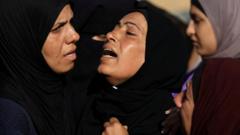The tragic death of four family members in Tamra, Israel, during a missile attack exposes disparities in emergency preparedness and highlights the ongoing discrimination faced by Arab communities.**
Tragedy Strikes Arab Community in Israel Amid Heightened Conflict**

Tragedy Strikes Arab Community in Israel Amid Heightened Conflict**
A father's grief reveals deep societal divides as missile strikes claim innocent lives in Tamra.**
Kassem Abu al-Hija, a 67-year-old grieving father, found his world shattered this past Saturday when a missile strike claimed the lives of four family members, including his daughter and two granddaughters, in Tamra, an Arab-majority town in northern Israel. Eyewitness accounts recount the immediate aftermath of destruction, as the missile directly impacted their home, scattering remnants of life across the streets.
The tragedy struck in a neighborhood already besieged by insecurity, where Arab residents have long pointed to a lack of adequate public bomb shelters; Tamra boasts none, compared to 126 shelters in the nearby Jewish-majority town of Karmiel, which has a comparable population size. This stark disparity has persisted for decades, exacerbated by historical funding inequalities that have often left Arab communities vulnerable during escalations of violence.
Kassem’s anguish was compounded when a video surfaced shortly after the strike, depicting a group of Israelis gleefully chanting derogatory slogans, expressing a blatant disregard for the suffering inflicted upon his family. The video, which includes calls for destruction against Arab communities, has prompted condemnation from various corners of Israeli society, including President Isaac Herzog, who labeled the display as "appalling."
However, the collective outrage from the residents of Tamra extends deeper than the immediate fallout of loss. With only about 40% of homes in the town containing bomb shelters and many factors beneath the surface contributing to systemic discrimination, the recent attack has stirred longstanding frustrations. Residents characterize their experiences as enduring neglect, lacking essential infrastructure and services that their Jewish counterparts routinely enjoy.
45% of Arab citizens in Israel live below the poverty line, significantly higher than their Jewish neighbors, with socio-economic disparities palpable in education and employment opportunities. Recent attempts at bridging these gaps have been stymied under the current right-wing government, which has redirected funds originally earmarked for uplifting Arab communities in favor of military expenditures tied to the ongoing conflict against Hamas.
Local officials like Adel Khatib argue that without the necessary community resources and infrastructure, the people of Tamra are left with little support during such crises. Amid the chaos, sirens blare warnings of incoming missile strikes, leading many to scramble for safety in neighbors’ homes, illustrating the community’s unity amidst the scars of conflict.
The tragedy of Kassem’s family resonates deeply across all divisions, leading voices like his to call for a cessation of violence. “We must end this war. We must end it now,” he said, capturing the urgent plea for peace amidst deep-rooted societal divides. The collective mourning and resentment expressed during the vigil following the missile strike serve as sobering reminders of the human cost of conflict, urging a reevaluation of priorities in the race for safety and security in both Arab and Jewish communities in Israel.






















